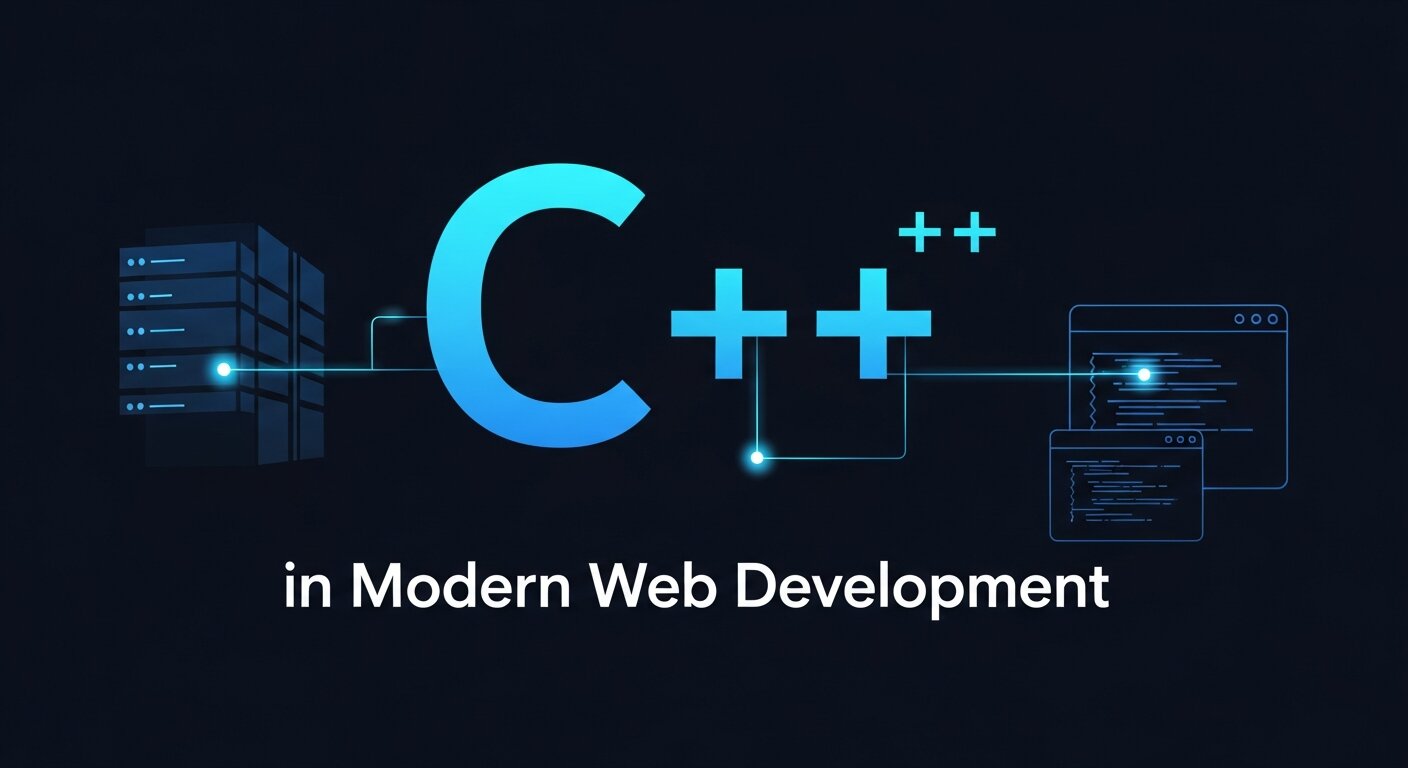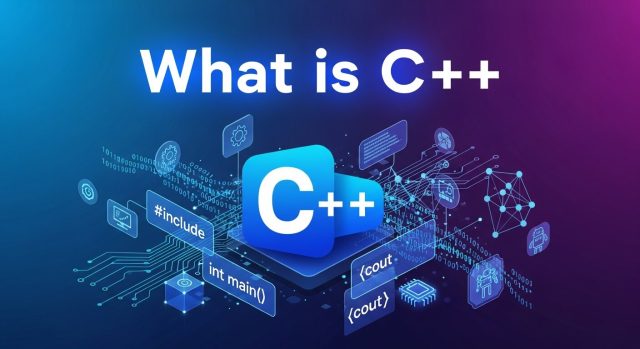C++ stands as one of the most influential programming languages ever created. Despite being developed in the 1980s, it continues to power everything from video games to operating systems, and yes, even modern web development applications.
This guide will walk you through everything you need to know about C++, from its core concepts to its real-world applications. Whether you’re considering learning your first programming language or exploring options for web development projects, understanding C++ will give you valuable insights into how software works at its foundation.
The Origins and Evolution of C++

C++ emerged in 1985 as an extension of the C programming language. Bjarne Stroustrup, a Danish computer scientist working at Bell Labs, created C++ to combine the efficiency of C with object-oriented programming features.
The name “C++” comes from the increment operator in C programming, symbolizing an enhanced version of the original language. This naming convention reflects the language’s core philosophy: building upon proven foundations while adding powerful new capabilities.
Over the decades, C++ has undergone significant evolution. Major updates include C++98, C++03, C++11, C++14, C++17, and C++20, each introducing new features and improvements. The language has maintained backward compatibility while embracing modern programming concepts.
Core Features That Define C++
Object-Oriented Programming
C++ introduced object-oriented programming (OOP) to mainstream development. This paradigm allows developers to create classes and objects, making code more modular and reusable. Key OOP concepts include:
- Classes and Objects: Templates for creating data structures
- Inheritance: Ability to create new classes based on existing ones
- Polymorphism: Using a single interface to represent different underlying forms
- Encapsulation: Hiding internal implementation details
Memory Management
Unlike languages with automatic garbage collection, C++ gives developers direct control over memory allocation and deallocation. This control enables optimization but requires careful attention to prevent memory leaks.
Template System
C++ templates allow developers to write generic code that works with different data types. This feature enables the creation of flexible, reusable components without sacrificing performance.
Standard Template Library (STL)
The STL provides a collection of ready-to-use classes and functions, including containers, algorithms, and iterators. This extensive library accelerates development and promotes best practices.
How C++ Works: Compilation and Execution
C++ follows a compiled language model, meaning source code must be translated into machine code before execution. This process involves several steps:
- Preprocessing: The preprocessor handles directives like #include and #define
- Compilation: The compiler converts source code into object files
- Linking: The linker combines object files and libraries into an executable program
This compilation process results in highly optimized machine code that runs directly on the target hardware, contributing to C++’s reputation for performance.
C++ in Modern Web Development

While not traditionally associated with web development, C++ plays several important roles in modern web applications:
Backend Services
C++ excels in building high-performance backend services and APIs. Companies like Facebook, Google, and Microsoft use C++ for performance-critical server components that handle millions of requests.
WebAssembly Integration
WebAssembly (WASM) has opened new possibilities for C++ in web development. Developers can now compile C++ code to run in web browsers, enabling:
- High-performance web applications
- Porting desktop applications to the web
- Complex calculations and data processing in browsers
Database Systems
Many popular databases used in web development are written in C++, including MySQL, MongoDB, and PostgreSQL. Understanding C++ helps developers optimize database interactions and troubleshoot performance issues.
Web Servers and Frameworks
Several web servers and frameworks leverage C++ for performance:
- Nginx: Popular web server written in C
- Crow: C++ microframework for web applications
- Dragon: High-performance C++ web framework
Comparing C++ to Other Programming Languages
C++ vs. Python
Python offers simpler syntax and faster development cycles, making it popular for web development frameworks like Django and Flask. C++ provides superior performance but requires more development time.
C++ vs. JavaScript
JavaScript dominates client-side web development and has expanded to server-side applications through Node.js. C++ offers better performance for computationally intensive tasks but lacks JavaScript’s web-native features.
C++ vs. Java
Java provides platform independence and automatic memory management, making it popular for enterprise web applications. C++ offers more control and better performance, but requires more careful resource management.
Learning C++: Getting Started
Essential Concepts to Master
Begin your C++ journey by understanding these fundamental concepts:
- Variables and Data Types: Learn about integers, floats, strings, and custom types
- Control Structures: Master if statements, loops, and switch statements
- Functions: Understand how to write reusable code blocks
- Pointers and References: Grasp memory management concepts
- Classes and Objects: Explore object-oriented programming principles
Development Environment Setup
Setting up a C++ development environment requires:
- Compiler: GCC, Clang, or Microsoft Visual C++
- IDE: Visual Studio, Code::Blocks, or CLion
- Debugger: GDB or integrated IDE debuggers
- Build System: Make, CMake, or IDE-integrated build tools
Practice Projects
Start with simple projects and gradually increase complexity:
- Calculator application
- Text-based games
- File processing utilities
- Simple web server
- Data structure implementations
Real-World Applications of C++

Game Development
C++ dominates game development due to its performance capabilities. Popular game engines like Unreal Engine and many AAA games are built with C++.
System Programming
Operating systems, device drivers, and embedded systems rely heavily on C++. The language’s efficiency makes it ideal for resource-constrained environments.
Financial Systems
High-frequency trading systems and financial modeling applications use C++ for its speed and precision in numerical calculations.
Scientific Computing
Research institutions and engineering companies use C++ for simulations, data analysis, and computational modeling.
Challenges and Considerations
Learning Curve
C++ has a steeper learning curve compared to higher-level languages. Concepts like memory management and pointers require careful study and practice.
Development Time
C++ development typically takes longer than using interpreted languages. The compilation process and manual memory management add complexity.
Debugging Complexity
Memory-related bugs can be challenging to identify and fix. Tools like Valgrind and AddressSanitizer help, but prevention through good coding practices is essential.
The Future of C++ in Web Development

C++ continues evolving to meet modern development needs. Recent standards have introduced features that make the language more approachable:
- Smart Pointers: Automatic memory management
- Lambda Expressions: Functional programming features
- Range-based For Loops: Simplified iteration
- Type Dedication: Reduced verbosity with the auto keyword
WebAssembly’s growing adoption suggests C++ will play an increasingly important role in web development, especially for performance-critical applications.
Making the Right Choice for Your Projects
C++ excels in scenarios requiring maximum performance, system-level programming, or existing C++ codebases. For web development, consider C++ when:
- Building high-performance backend services
- Developing computationally intensive web applications
- Integrating with existing C++ libraries
- Creating WebAssembly modules for browsers
For rapid prototyping and typical web applications, languages like Python, JavaScript, or Go might be more suitable choices.
C++ and Cloud-Native Architectures
As cloud computing continues to dominate modern infrastructure, C++ remains relevant in performance-critical cloud components. While many cloud platforms promote Serverless Web Development for rapid deployment and scalability, C++ is often used behind the scenes to power high-efficiency runtimes and execution engines. Its speed and low-level memory control make it suitable for building lightweight services that support serverless functions at scale. Developers working with microservices architectures may use C++ to optimize latency-sensitive operations such as data processing, authentication systems, or API gateways. When performance and efficiency directly impact infrastructure costs, C++ becomes a strategic choice for organizations building scalable cloud-native systems.
C++ in Intelligent Application Development
Modern applications increasingly integrate artificial intelligence features such as recommendation engines, chatbots, and predictive systems. C++ plays a significant role in powering performance-intensive AI libraries and frameworks. Many machine learning backends are written in C++ to maximize execution speed and hardware utilization. As AI in Web Development grows, C++ helps handle complex computations, real-time inference, and large-scale data processing tasks that web interfaces rely on. Even when developers use higher-level languages for model training, the underlying execution layers often depend on optimized C++ code. This makes C++ an essential language for developers interested in combining intelligent systems with high-performance web applications.
Enhancing Performance for Large-Scale Applications
Scalability becomes a challenge when web applications begin serving millions of users. C++ offers fine-grained optimization capabilities that help reduce latency and improve throughput. Its efficient memory handling and compilation to native machine code provide advantages in high-traffic environments. Organizations building real-time communication platforms, streaming services, or financial dashboards benefit from C++ components that manage concurrency and parallel processing effectively. With modern C++ standards supporting multithreading and asynchronous programming, developers can create systems that maintain stability under heavy load. This performance-oriented approach ensures applications remain responsive while minimizing infrastructure overhead and maximizing long-term operational efficiency.
Security and Reliability Considerations
Security is a crucial factor in web and system-level development. C++ allows developers to implement robust security mechanisms, encryption libraries, and secure communication protocols with deep control over system resources. However, its flexibility also demands disciplined coding practices to avoid vulnerabilities such as buffer overflows or memory corruption. Modern C++ standards and tools have introduced safer memory management techniques that reduce risk when properly applied. By combining secure design principles with careful testing, developers can build highly reliable systems. In industries like finance, healthcare, and infrastructure, C++ continues to be trusted for mission-critical software where performance and security must coexist.
Cross-Platform Development and Portability
One of C++’s greatest strengths is its portability across different operating systems and hardware architectures. Applications written in C++ can be compiled for Windows, macOS, Linux, and embedded systems with minimal modification. This cross-platform capability makes it ideal for projects that require consistent performance across diverse environments. Developers can write core logic once and deploy it across multiple platforms using appropriate compilers and build tools. Additionally, C++ integrates well with other programming languages, enabling hybrid development strategies. This flexibility ensures that teams can leverage C++ for performance-critical modules while maintaining compatibility with modern frameworks and user-facing technologies.
Your Next Steps with C++
C++ remains a powerful tool in the modern developer’s toolkit. Its combination of performance, flexibility, and extensive ecosystem makes it valuable for various applications, including specialized areas of web development.
Start by mastering the fundamentals through hands-on practice. Focus on understanding memory management, object-oriented principles, and the standard library. As you build confidence, explore advanced topics like templates, concurrency, and modern C++ features.
Consider how C++ might complement your web development skills. Whether you’re optimizing backend performance, exploring WebAssembly, or building development tools, C++ knowledge will expand your capabilities and deepen your understanding of how software works.
The journey to mastering C++ requires patience and practice, but the skills you develop will serve you well throughout your programming career.
Frequently Asked Questions (FAQ)
1. What is C++ mainly used for?
C++ is widely used for system programming, game development, high-performance applications, embedded systems, financial software, and parts of modern web infrastructure. It is especially popular where speed and resource control are critical.
2. Is C++ good for beginners?
C++ can be challenging for beginners due to concepts like pointers and manual memory management. However, learning C++ builds a strong foundation in programming fundamentals, making it easier to understand other languages later.
3. Is C++ still relevant in 2026?
Yes, C++ remains highly relevant. It powers game engines, operating systems, browsers, databases, and performance-critical backend services. With the rise of WebAssembly, C++ is also gaining more importance in web applications.
4. What is the difference between C and C++?
C++ is an extension of C that adds object-oriented programming features such as classes, inheritance, and polymorphism. While C focuses on procedural programming, C++ supports both procedural and object-oriented paradigms.
5. Can C++ be used for web development?
Yes, C++ can be used for backend services, web servers, and WebAssembly modules that run in browsers. While it is not as common as JavaScript or Python for traditional web apps, it is ideal for performance-intensive components.
6. How long does it take to learn C++?
The basics can be learned in a few months with consistent practice. Mastering advanced topics like templates, concurrency, and memory optimization may take a year or more, depending on experience and dedication.
7. What are the advantages of C++ over other languages?
C++ offers high performance, fine-grained memory control, object-oriented programming support, and a powerful standard library. It is particularly strong in scenarios requiring speed and hardware-level interaction.
8. Does C++ have automatic memory management?
Traditional C++ does not include automatic garbage collection like Java or Python. However, modern C++ provides smart pointers and RAII (Resource Acquisition Is Initialization) techniques to manage memory more safely.
9. Which compilers are commonly used for C++?
Popular C++ compilers include GCC, Clang, and Microsoft Visual C++. These compilers support modern C++ standards and are available across multiple platforms.
10. Should I learn C++ before learning other languages?
It depends on your goals. If you want a deep understanding of how programming works at a low level, C++ is an excellent starting point. If your goal is rapid web or app development, you might start with a higher-level language and learn C++ later.







